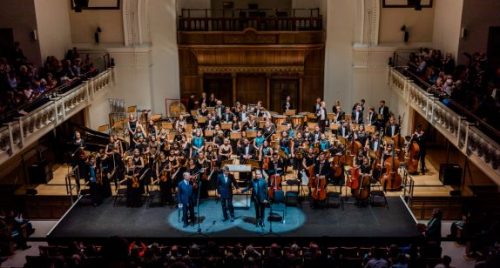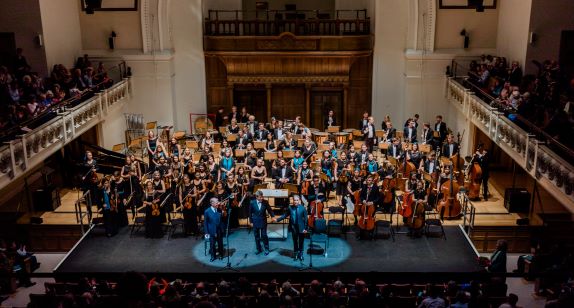 United Kingdom Vaughan Williams, Rachmaninov, Britten, Shostakovich: Pavel Kolesnikov (piano), Edward and Freddie Fox (narrators), Britten-Shostakovich Festival Orchestra / Jan Latham-Koenig (conductor). Cadogan Hall, London, 26.9.2019. (CC)
United Kingdom Vaughan Williams, Rachmaninov, Britten, Shostakovich: Pavel Kolesnikov (piano), Edward and Freddie Fox (narrators), Britten-Shostakovich Festival Orchestra / Jan Latham-Koenig (conductor). Cadogan Hall, London, 26.9.2019. (CC)

Vaughan Williams – Fantasia on a theme of Thomas Tallis
Rachmaninov – Rhapsody on a theme of Paganini, Op.43
Britten – Four Sea Interludes from ‘Peter Grimes,’ Op.33a (with readings from George Crabbe’s poem The Borough)
Shostakovich (arr. Latham-Koenig) – Hamlet, Op.116 for actors and orchestra
The Britten-Shostakovich Festival Orchestra (BSFO for short) is the brainchild of British conductor Jan Latham-Koenig, who is also Artistic Director of Novaya Opera in Moscow. This was the final concert of the orchestra’s inaugural tour, a journey that started on September 9 in Sochi, Russia, with a programme nearly identical to this one (Hamlet was replaced by Shostakovich’s Variety Suite; the Waltz of the latter the second of two encores to the present concert). The orchestra comprises young musicians either studying or at the start of their careers – the median age is 21/22 – a compendium of fresh talent exploring innovative and stimulating programmes. Inspired by the historic cross-cultural meeting of Britten and Shostakovich – a meeting facilitated and encouraged by Mstislav Rostropovich – the orchestra aims to bring together two countries, the United Kingdom and Russia, in a new way: music as trailblazer, perhaps, a trait particularly highlighted as the United Kingdom teeters on the brink in its search for an elusive independence.
The real stand-out element of this orchestra is that it has a built-in longevity: it has always been planned to be a long-term venture and will become an annual fixture for both countries. Looking forward, there will be commissions from young composers of both territories, the bilateral link always in view. Patrons are Yuri Temirkanov, HRH Prince Michael of Kent (who gave a short speech to kick off the concert’s second half) and Mme. Irina Shostakovich.
Inspired by Barenboim’s West-Eastern Divan Orchestra, the BSFO only gathered for the first time in September 2019 – this very month – for a week’s residency in Sochi’s Sirius Park of Science and Art. Musicians from a huge variety of conservatoires took part, from Saint Petersburg and Rostov to Birmingham and Cardiff. Thanks to funding from Rosneft and BP, the experience is free of charge to the members of the orchestra. The musicians were coached by professionals in what appears a superhuman amount of repertoire, including (for some of the Russian performances) a rare outing for Shostakovich’s 1964 symphonic poem Execution of Stepan Razin, Op.119 with the bass Alexei Antonov (a splendid piece: see my review of the Chandos recording here); in one programme, it sat alongside Britten’s equally rarely-heard Young Apollo (this with Ilya Chirskov as pianist).
The UK concerts (Edinburgh review click here) have included pieces such as Tchaikovsky’s 1812 Overture, Vaughan Williams’s The Lark Ascending and extracts from Prokofiev’s Romeo and Juliet (with, again, this latter providing the first encore: the Grave Scene, preceded by Freddie Fox reading Romeo’s death speech). This particular programme seemed particularly well sculpted, closing with pieces by the orchestra’s two ‘Founding Fathers’, Britten and Shostakovich. The mutual respect the two composers held for each other makes the programme’s close particularly apt. Of course, there were significant dedications to each other within their individual outputs: Britten dedicated The Prodigal Son to Shostakovich, while Britten is the dedicatee of Shostakovich’s Symphony No.14.
This particular evening began with Vaughan Williams’s Fantasia on a theme by Thomas Tallis, written originally for the Three Choirs Festival and first performed in Gloucester Cathedral. The small string group was placed at the back of and above the orchestra, loftily elevated. The first impression of the massed string sound was of clarity married to radiance, the sweet-toned violin of leader Margarita Kirakosova a particular delight. From seats in the balcony, the dialogue between tutti and solo group was a joy; the whole grounded by a fabulous double-bass section.
If the Vaughan Williams is a piece that revels in the beauty of sound itself, Rachmaninov’s Paganini Rhapsody is somewhat more bracing. This Rachmaninov has been well-served of late: first, there was the revelatory Proms account this year by Joan Pérez Floristan, stepping in for an indisposed Alexander Gavrylyuk and finding lightness and sophistication in the score (review); now, the ever-stimulating Pavel Kolesnikov, a force to be reckoned with in the excellent current pantheon of young pianists. Kolesnikov’s recital at the London Piano Festival last year was revelatory (Louis Couperin and Schumann), while his performance of the first revised version (1879) of Tchaikovsky’s First Piano Concerto at the Barbican with the BBC Symphony and Oramo, also in 2018, was no less impressive (review). His performance of the Paganini Rhapsody here was just as revelatory and fresh as Floristan’s; his advantage was the orchestra. Excellent though Floristan’s BBC Philharmonic was, the Britten-Shostakovich Festival Orchestra had the upper hand, playing as if the music was part of their DNA, the brass deep and penetrating, the tricksy moments of ensemble impeccably managed thanks to Latham-Koenig’s evident discipline. Kolesnikov displayed the most astonishing fluidity; his rhythmic mastery, too, was superb. The famous 18th variation offered plenty of expression without a hint of indulgence; but the way that Kolenikov and Latham-Koenig brought the music to climax thereafter was masterly. An encore was, perhaps, inevitable: a beautifully shaped Chopin Prelude in D flat, Op.28/15, the so-called ‘Raindrop’.
Interspersed with readings from George Crabbe’s 1810 poem The Borough, Britten’s ‘Four Sea Interludes’ from Peter Grimes took on a new meaning, with father and son Edward and Freddie Fox clear and sonorous. How naturally the supremely together high strings and flute of the opening ‘Dawn’ emerged from Crabbe’s words and how creamy and well-balanced the brass were in response. The bell overtone effect of ‘Sunday Morning’ in the horns was brilliantly done; rhythmically, too, this movement was a triumph, while the hairpins of ‘Moonlight’ could hardly have been more evocative. It was the fast, visceral ‘Storm’ that glowered unforgettably, though, the bright trumpets contrasted with the orchestra’s dark lower registers.
The idea of using actors in Jan Latham-Koenig’s own Suite from Shostakovich’s music for the film Hamlet was inspired. Edward and Freddie Fox triumphed in their recitations of Shakespeare’s classic text while the orchestra lived every moment of Shostakovich’s score. The Introduction, with its jagged chords set against an anguished, high-placed melody for lower strings and horns is echt-Shostakovich; the ensuing ‘Ball at the Palace’ heard here as one of those pieces in Shostakovich-in-Keystone-Cops vein, manic and not a little crazy. The brief ‘Poisoning Scene’ and the ‘Arrival and Scene of the players,’ a resolute, obsessive march, found the young players revelling in some of Shostakovich’s wonderfully outrageous writing before we hear the solo flute-led ‘Ophelia’ and, finally, the ‘Duel and Death of Hamlet,’ intensely dramatic and gripping. Even in its most extreme moments, Latham-Koenig kept the textures miraculously balanced; this never descended into mere noise. The entire score of Hamlet is well worth acquaintance, incidentally: for my review of the Naxos Film Music Classics performance of the full score with the Russian Philharmonic under Dmitri Yablonsky click here.
When I spoke with Jan Latham-Koenig about this orchestra some time ago, one word that cropped up again and again was ‘excellence’. That was the clear goal; a goal that has, beyond doubt, been achieved. A triumph from every angle.
Colin Clarke
